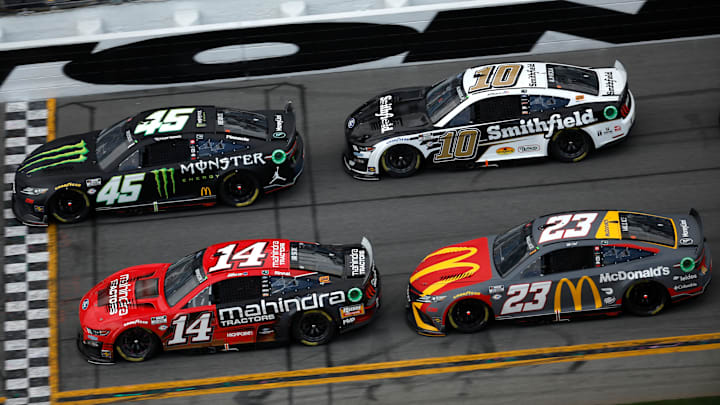After several months of the antitrust lawsuit filed by 23XI Racing and Front Row Motorsports against NASCAR seemingly going in circles, a major development unfolded last week.
We aren't lawyers here at Beyond the Flag and aren't going to pretend to be, so we'll cut to the chase and try to keep this as simple as possible.
Both 23XI Racing and Front Row Motorsports refused to sign the new charter agreement last year, and their ensuing lawsuit was based on the idea that NASCAR operates as a monopoly. The goal was to get better terms out of the new agreement after the old one, implemented in 2016, expired.
But before the 2025 season, a judge ruled that NASCAR had to allow them to race with not only the two charters they each already had, but with the additional charters they had planned on acquiring from Stewart-Haas Racing, making both teams three-car chartered teams. NASCAR had been attempting to block those charter transfers but was not allowed to do so.
The new charter agreement is a seven-year deal that aligns with the new seven-year, $7.7 billion media rights deal, which includes not only Fox and NBC but new broadcast partners Amazon Prime Video and TNT Sports.
There is an additional seven-year option which could extend the charter agreement through 2038, but another argument of these teams is that charters should be permanent, given their market price.
Now a judge has ruled in favor of NASCAR, and 23XI Racing and Front Row Motorsports could lose their charter status in as little as three weeks (now two), which would leave the Cup Series with only 30 chartered cars rather than 36 and cloud the future of the other six charters.
23XI Racing teammates Tyler Reddick and Bubba Wallace are said to have contracts which allow them to seek new rides if their entries are not chartered. But without charters, they, along with rookie teammate Riley Herbst and the Front Row Motorsports trio of Todd Gilliland, Noah Gragson, and Zane Smith, would no longer be locked into each race and would need to qualify to secure their spots.
Operating as non-chartered teams will also cost these two teams a significant amount of money.
The big winner here? Stewart-Haas Racing, ironically a team that no longer actually exists.
During the offseason litigation and back-and-forth regarding whether or not 23XI Racing and Front Row Motorsports would be able to operate with charters in 2025, NASCAR initially did block those two teams from acquiring their desired third charters from Stewart-Haas Racing.
Given the hefty price tag on charters, even if it's not the $40 million figure it once was, this was a massive development, in that NASCAR was also effectively screwing over a team that had already shut down. They were preventing them from doing business with two clear-cut buyers willing to fork over a lot of money to confirm long-awaited expansions to their programs.
Team owner Gene Haas retained one of Stewart-Haas Racing's four charters to run the new Haas Factory Team, but he had no use for any of the other three. One went to Trackhouse Racing as a part of a relatively straightforward transaction, but the other two, even now in June, remain in limbo.
Why Stewart-Haas Racing is the big winner here is because they were indeed able to part ways with their charters after the acquisitions were forced to be unblocked.
Their involvement is these transactions, and in the sport as a whole, is now done and dusted, and 23XI Racing and Front Row Motorsports have already been able to operate as chartered teams, notably with the third charters they acquired from the now defunct organization.
Had NASCAR been able to fully block those transfers, Stewart-Haas Racing would have been left with useless charters, and they would have had to hope for NASCAR to give them the appropriate compensation. Haas Factory Team were never going to run more than one car in 2025, and at that point, there were not any other serious potential buyers left for the other charters.
Instead, 23XI Racing and Front Row Motorsports got their way initially, only for the latest ruling to see their charter status in jeopardy moving forward. The future of their charters may be in question, but at least Stewart-Haas Racing aren't around to have to deal with the fallout.
While Hamlin reportedly remains confident, one can only wonder if he's simply after leverage after the latest ruling. The simplest solution appears to be for the teams to sign the charter agreement and stop pursuing the lawsuit.
It's no secret that the other 13 teams weren't thrilled with the terms either, but they knew that it was the best they were going to get. Nearly a year later, they've been proven right.
This latest ruling has made it clear that, right or wrong, moral or immoral, and monopoly or no monopoly, NASCAR is going to get the favorable calls when it comes to this lawsuit, and the writing has been on the wall for some time now.
Rather than another six months of non-update "updates" rolling in, the case doing nothing more than going in circles, and two teams (and their six drivers) facing increasingly clouded futures, perhaps 23XI Racing and Front Row Motorsports should do what the other 13 teams did and bite the bullet.
